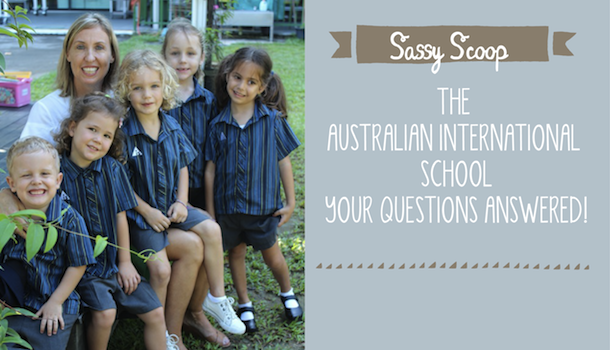
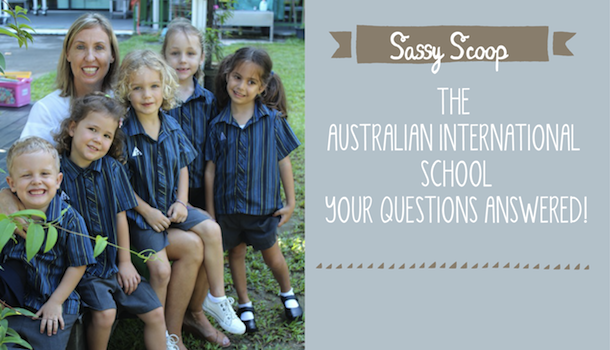 We grilled Kirsti Hitz-Morton of the Australian International School (Acting Assistant Head of the Junior School) to get the lowdown on those all-important questions about AIS but also to get some useful tips on school choices and managing change for your kiddo. Read on to get the lowdown!
We grilled Kirsti Hitz-Morton of the Australian International School (Acting Assistant Head of the Junior School) to get the lowdown on those all-important questions about AIS but also to get some useful tips on school choices and managing change for your kiddo. Read on to get the lowdown!
How can I help my child cope in a structured school environment, when he’s only ever been in a small nursery school environment?
The transition from a small preschool environment into a larger and more formal setting can be a difficult one for some children. There are a number of suggested strategies that we recommend parents use, but the most important thing is that parents always remain positive!
What is your approach to learning a second language? How much exposure will my child receive to a second language at AIS?
We have a fantastic Mandarin program at AIS. Students may sing, dance and play a number of games during the ‘immersion process’. In 2014 we will be providing our junior school students with a five day a week second language program, where each class will do a 35-minute period of Mandarin each day.
What type of curriculum does the school follow and how easy would it be for my child to then transfer to a new school in a different country if we move internationally?
AIS implements the International Baccalaureate Primary Years Programme (PYP) which provides the curriculum framework for all learning in the Elementary School. The PYP recognises that development and learning are interrelated, so your child will develop knowledge, skills, concepts, and attitudes across a range of subject areas. A move to a new school will come relatively easy, as the PYP focuses on the student being a risk-taker and developing resilience, something all good schools will promote.
What systems are in place to help munchkins settle into “big school”? How does the school keep little ones safe, especially when there are 2000+ students at AIS?
We like to ease our students through the transition into the junior school with our wonderful Preschool to Prep transition process. When prep students start at AIS we provide them with lots of reassurance and support. Our prep classes all have access to a smaller playground for use at break times and we have a fantastic School Counsellor who runs social skills sessions and a playground pal programme that supports students in the larger playground. We also run a buddy progra me where students have opportunities to make lasting friendships with older students in the preschool, junior school and primary schools.
How does the school typically communicate with parents? How do I stay in touch with what my child is doing at school each week?
Parents are encouraged to chat with their child’s teacher at any time and the best way is to make an appointment to talk in depth. A class newsletter and a whole school weekly newsletter are emailed to parents each Friday.
What readiness signs should I be looking for in my child that might indicate he is ready for primary school?
First and foremost look for the ability to establish friendships. Students with great social skills don’t find the transition daunting at all.
What emphasis does AIS place on extracurricular activities, like sport, art and drama?
A wide selection of activities are available to all students in the junior school. Some of these include junior choir, junior orchestra, chess, science, cooking and much more.
How can I help my child at home, so he can cope with the demands of full-time schooling?
A good night’s rest and a healthy balanced diet helps to keep your child fit and healthy and therefore ready to take on the demands of full-time schooling.
What behavioural changes might I expect in my child now that he’s in full-time school? Are there warning signs I should look for which might indicate he/she is really struggling?
In the first few weeks or months of the school year your child will be incredibly tired. Allowing your child to gain 10-12 hours of sleep a night is definitely recommended. Your child may temporarily withdraw from activities that he or she previously enjoyed and this is quite normal. Give your child time to adjust to their new school routine and remember to be a listening ear for your child, without expressing any of your concerns to them. If you are worried about your child’s behaviour don’t hesitate to talk to your child’s teacher. He or she will give you the best advice.
Thanks Kirsti for your words of wisdom! For more information or to enroll your child now, contact the Australian International School at 6883 5155 or via their website.
Australian International School
1 Lorong Chuan, Singapore 556818
Tel: (+65) 6883 5155
www.ais.com.sg






 View All
View All
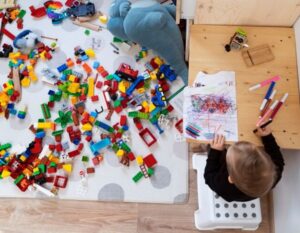

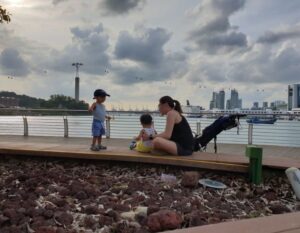


 View All
View All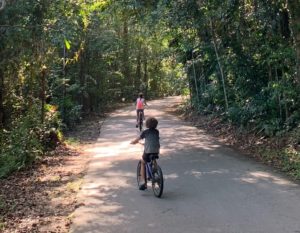









 View All
View All







